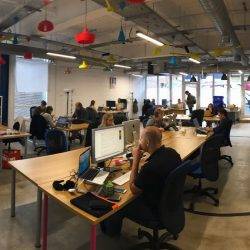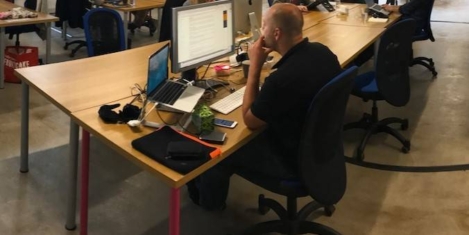January 15, 2018
Manchester, Brighton and Edinburgh seen as best places for freelancers to work
 A new report from price comparison website MoneySuperMarket published to coincide with Working from Home Week claims that Manchester, Brighton and Edinburgh are the best UK cities in which freelancers can work. The report looks at the number of existing freelancers in 22 UK cities, the average rates they charge and the number of start-ups looking to utilise local freelancers. To assess the work-life balance of freelancers, the research also gauged local property costs, the number of wi-fi hotspots and coffee shops, as well as the general quality of life in the area.
A new report from price comparison website MoneySuperMarket published to coincide with Working from Home Week claims that Manchester, Brighton and Edinburgh are the best UK cities in which freelancers can work. The report looks at the number of existing freelancers in 22 UK cities, the average rates they charge and the number of start-ups looking to utilise local freelancers. To assess the work-life balance of freelancers, the research also gauged local property costs, the number of wi-fi hotspots and coffee shops, as well as the general quality of life in the area.







 Two-thirds (64 percent) of employees have gone to work despite being unwell over the last 12 months, claims a new survey which found that a quarter (26 percent) of people worried that their absence will be a burden on their team. The research by Bupa shows that more than one in four (27 percent) employees ignore their doctor’s orders to stay at home and ‘soldier on’. A third of employees would go to work despite back pain or issues related to their joints and, disturbingly, a similar number (29 percent) head to work when suffering from mental health issues such as depression. As two of the most common reasons to be signed off work, Bupa’s experts fear these employees risk worsening their health, increasing the likelihood that they’ll need a prolonged period of time off work further down the line. The findings come at a time when increasing productivity is a strategic goal for most business leaders in 2018. But high levels of ‘presenteeism’ are in fact associated with loss of productivity and reduced performance – as employees who push themselves into work when unwell, risk delaying their own recovery
Two-thirds (64 percent) of employees have gone to work despite being unwell over the last 12 months, claims a new survey which found that a quarter (26 percent) of people worried that their absence will be a burden on their team. The research by Bupa shows that more than one in four (27 percent) employees ignore their doctor’s orders to stay at home and ‘soldier on’. A third of employees would go to work despite back pain or issues related to their joints and, disturbingly, a similar number (29 percent) head to work when suffering from mental health issues such as depression. As two of the most common reasons to be signed off work, Bupa’s experts fear these employees risk worsening their health, increasing the likelihood that they’ll need a prolonged period of time off work further down the line. The findings come at a time when increasing productivity is a strategic goal for most business leaders in 2018. But high levels of ‘presenteeism’ are in fact associated with loss of productivity and reduced performance – as employees who push themselves into work when unwell, risk delaying their own recovery Impostor syndrome (where we feel like we are ‘faking it’ at the job we are doing) could be holding back many senior executives from realising their potential – according to new research from Dropbox on the state of teamwork within businesses in the UK. The research, which marks the launch of a new study, conducted in conjunction with philosophers at The School of Life reveals that 80 percent of Chief Executive Officers (CEOs) and 81 percent of Managing Directors say they sometimes feel ‘out of their depth’ and as if they are ‘struggling’ in their role. The research investigates behaviours in business that are limiting to great teamwork. Being averse to disagreeing with others – often seen as a typically British trait – is identified as a key issue holding back teams within British business. The data also claims that two thirds of British workers (69 percent) say that they aren’t comfortable disagreeing with others at work.
Impostor syndrome (where we feel like we are ‘faking it’ at the job we are doing) could be holding back many senior executives from realising their potential – according to new research from Dropbox on the state of teamwork within businesses in the UK. The research, which marks the launch of a new study, conducted in conjunction with philosophers at The School of Life reveals that 80 percent of Chief Executive Officers (CEOs) and 81 percent of Managing Directors say they sometimes feel ‘out of their depth’ and as if they are ‘struggling’ in their role. The research investigates behaviours in business that are limiting to great teamwork. Being averse to disagreeing with others – often seen as a typically British trait – is identified as a key issue holding back teams within British business. The data also claims that two thirds of British workers (69 percent) say that they aren’t comfortable disagreeing with others at work.
 Over half (52 percent) of people who work remotely feel their colleagues don’t treat them equally, claims a new study. Working remotely has become a highly sought-after job perk and having the flexibility to live and work where you please, regardless of corporate headquarters, often draws people to take one job over another. But a survey from VitalSmarts produced by David Maxfield and Joseph Grenny, authors of the bestsellers Crucial conversations and Crucial Accountability, found that remote employees have a significantly harder time with a number of workplace challenges than their onsite colleagues. 67 percent of remote employees complained that colleagues didn’t fight for their priorities compared 59 percent of onsite employees. 41 percent of remote employees believed colleagues say bad things about them behind their back compared to 31 percent of onsite employees and 64 percent of remote employees had changes made to a project without warning vs. 58 percent of onsite employees. Over a third (35 percent) of remote employees thought colleagues were lobbying against them vs. 26 percent of onsite employees.
Over half (52 percent) of people who work remotely feel their colleagues don’t treat them equally, claims a new study. Working remotely has become a highly sought-after job perk and having the flexibility to live and work where you please, regardless of corporate headquarters, often draws people to take one job over another. But a survey from VitalSmarts produced by David Maxfield and Joseph Grenny, authors of the bestsellers Crucial conversations and Crucial Accountability, found that remote employees have a significantly harder time with a number of workplace challenges than their onsite colleagues. 67 percent of remote employees complained that colleagues didn’t fight for their priorities compared 59 percent of onsite employees. 41 percent of remote employees believed colleagues say bad things about them behind their back compared to 31 percent of onsite employees and 64 percent of remote employees had changes made to a project without warning vs. 58 percent of onsite employees. Over a third (35 percent) of remote employees thought colleagues were lobbying against them vs. 26 percent of onsite employees.







December 19, 2017
We need to have an honest conversation about presenteeism
by Steve Brewer • Comment, Flexible working, Workplace design
We have talked before about the risks of over thinking problems. It is not just something that consultants, designers and the workplace intelligentsia are guilty of – everyone does it. It is why we do not switch off when we are ill and still insist on going to work. We over think the consequences of not being in our workplace. Likewise, many traditional line managers simply cannot get their head around their teams working from home. After all, modern management mantras all talk about creating a great atmosphere in which teams all work together – in the same space at the same time? We all tend to over complicate most things and that is one of the main reasons in the UK we struggle with the concept of working from home. A consequence of this is the rise in presenteeism, which is mainly linked to illness, people ignoring how bad they feel and because of a perceived pressure, still turning up for work.
(more…)